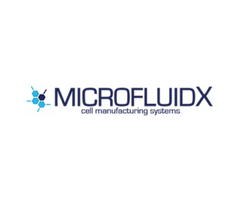Cell and gene therapies have proven to be effective methods of treatment for diseases such as Parkinson’s disease and a range of cancers. However, there are two main challenges hindering the use and accessibility of these therapies. The first is that development timelines can be slow, due to time spent on resource-intensive process redesigns. The second is that manufacturing costs are currently high, due to expensive reagents, the necessity of clean room facilities and high batch failure rates.
MicrofluidX Ltd is tackling the problems of process control, scalability, and high costs associated with cell bioprocessing, particularly for autologous cell and gene therapy. Its automated closed technology enables scientists to speedily carry out process development by running dozens of cell culture conditions in parallel, with extreme process control. MicrofluidX’s strategy then facilitates scale up of the optimal condition to several billion cells for manufacturing at a fraction of current costs, while maintaining the same process development cell environment, thus avoiding expensive process redesigns.
Dr James Kusena is Vice President of Bioprocessing and Applications at MicrofluidX. James joined the Shott Scale Up Accelerator programme in 2022. He says, “There are several areas of expertise that I would like to develop including: creative and strategic thinking, project management and effective decision-making. These would allow me to enhance my leadership skills for both projects and partnerships.”

MicrofluidX is now looking to further develop its microfluidics-based cell and gene therapy process development and manufacturing platforms. The company will do this by disseminating a range of prototypes to partners in order to gain further external validation. It will also finalise the research and development of its chip and cassette designs, ready for manufacturing. This will permit MicrofluidX to grow its network and close its Series A funding.
Associated Programme

